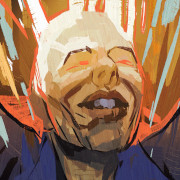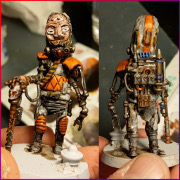|
Bongo Bill posted:The Kaktovik numeral system combines the positional notation of Arabic numerals with the tally-like capabilities of Roman numerals. This is pretty neat! 
|
|
|
|

|
| # ? May 24, 2024 03:43 |
|
aphid_licker posted:This is pretty neat! Yeah, that's cool. e: invented in 1994, a bit less cool https://en.wikipedia.org/wiki/Kaktovik_numerals
|
|
|
|
What's kinda wild to me is that that isn't the first idea you arrive at when you're inventing your numeral system. I guess 19 is a bit more economical to write in terms of strokes than its equivalent in the Kaktovik system.
|
|
|
|
Thatís a base 20 system because the native languages use the same.
|
|
|
|
That rules. And it was invented by some middle school kids??
|
|
|
|
|
https://www.youtube.com/watch?v=DXjsp5s2BS0 Kinda cool video of pronunciation of Korean/Japanese/Chinese over time.
|
|
|
|
drat that's a really nice video.
|
|
|
|
I know that I'd have a hard time learning that because I had a hard time telling apart n and m at a glance, the two letters that are just the same kind of squiggles that you need to count which way the squiggle goes.Nessus posted:That rules. And it was invented by some middle school kids?? I actually have old scribbles of my own little phonetic alphabet in my old middle school papers, and I think my parents told me they fiddled with doing the same. Once you have the general concept, it's all about just making the characters. If you're clever you can just steal characters from other alphabets, which is why king fictional language man Tolkien's "G" character in his Cirth alphabet is "F" in viking runes. Carillon posted:Given all the alphabet talk I was curious about number systems as well. I know a lot of the world has adapted the so called arabic numerals, but how many other approaches are still commonly used and are there any other common ones not based 10? Last I read, a lot of the more complex math during the dominance of Rome was actually done with Greek numerals, which makes sense, since Greek was the language of scholars and the more common language in the east and part of the major cultural split with the end of the empire. They used a system that I feel like is easier to grasp where they reused the letters in their alphabet as numbers and 1-9 got their own characters, but for the greater magnitudes, each multiple of 10 got its own character, and the same for each multiple of 100 and 1000, and then you'd string together those numbers. There is no zero. Hebrew actually borrowed the structure of greek numerals and gave every number from 1-20 its own character, then multiples of 10, then multiples of 100, then 1,000, 2,000, 5,000, and 10,000 got their own characters, and they had a system to denote decimal increases in magnitude after there. What's probably more important to keep in mind though if you're trying to get an idea of the history of math and numbers, is that numeral systems were only one way of representing that, and very often they weren't even the primary method most people used. There were abacuses, hand signs, the native american way of tying string called "nepohualtzintzin", and geometric diagrams, but most importantly, the most common way of representing numbers was words. Just words. A whole lot of the time, people would just talk out or write out the value in the words of their language, and that can get squirrelly to nail down. Most of us are taught in schools to think in base ten, but classically english as a language seems to denote more significance to base 12. French linguistically has remnants of a base 20. There's more, but I don't really know much and the last time I asked about numbers here, I got a lot of history nerds being averse to math. You might do better at poking through wikipedia.
|
|
|
|
SlothfulCobra posted:I know that I'd have a hard time learning that because I had a hard time telling apart n and m at a glance, the two letters that are just the same kind of squiggles that you need to count which way the squiggle goes. Russian is ridiculous with this, you got the p, which looks like an n, the i, which looks like a u, the z, which also looks like a u, the sh, which looks like an upside down m, the t, which can look like an m, the actual m, and the shtsh, which again looks like an upside down m. "Russian cursive" briefly became a meme as a result. 
|
|
|
|
FishFood posted:So, the Archaic Greek alphabet is known as Linear B and is not the direct ancestor of the Classical/Modern Greek alphabet. It is somewhat unique in that it went completely extinct during the Greek "Dark Age" following the Late Bronze Age Collapse. Greek society lost literacy, which is one of the few times that has happened I believe. The later Greek alphabet descends from the Phoenecian alphabet and has a totally different lineage. Ah, I remember reading something about that phenomenon. Some kind of theory that a certain level of complexity is needed in a society to make it and keep it literal. There are some other ancient civilizations from around Mesopotamia who first started writing in Sumerian, but then later abandoned it. I'm guessing that's what happened to the Greek here: Due to the simplification process imposed by the Collapse, Greek society didn't "need" literacy anymore to function, so it was lost over time. And then later Greek society recovered, and started needing a writing system again. And hey, fancy that, there are those Phoenician traders hanging around...
|
|
|
|
The Maya lost literacy when everything went to poo poo and IMO a huge part of that is it was class restricted so when that system went away so did the literacy.
|
|
|
|
Libluini posted:I'm guessing that's what happened to the Greek here: Due to the simplification process imposed by the Collapse, Greek society didn't "need" literacy anymore to function, so it was lost over time. And then later Greek society recovered, and started needing a writing system again. And hey, fancy that, there are those Phoenician traders hanging around... All the literacy in pre-dark age Greek society was based in the bureaucracy of the palatial order, which is also precisely what collapsed in the Greek dark age.
|
|
|
|
Yeah I think in a lot of old societies with low literacy rates, the reason for the low literacy was that it wasn't considered to be a universal skill that everyone who could learn should learn. It was a trade skill for scribes and record keepers, and the people who had to be able to read those records.
|
|
|
|
Almost all Linear B tablets have been discovered in palace complexes (I believe there has only been one discovery of them outside a palace), so it makes sense that with a rapid and dramatic collapse of the Bronze Age palace system, writing would vanish along with the palaces. Ancient writing systems tend to be quite restricted in who used them, but Linear B writing was even more restricted then most. One theory to explain this, is the idea that in Bronze Age Greece, all (or nearly all) scribes would have worked for the palace. The palaces may have even had a monopoly on training the scribes. This would fit with the highly focused nature of the contents of the Linear B tablets, which are almost exclusively administrative texts. In contrast, in the Near East, scribes were trained by a variety of parties and worked for both government and private employers, making literacy much more durable.
|
|
|
|
Carillon posted:Given all the alphabet talk I was curious about number systems as well. I know a lot of the world has adapted the so called arabic numerals, but how many other approaches are still commonly used and are there any other common ones not based 10? Modern people wirking with arabic numerals tend to make a lot of mistakes when subtracting. Roman numerals are good at adding and subtracting! It's if you try to multiply or divide that things fall apart.
|
|
|
|
Telsa Cola posted:The Maya lost literacy when everything went to poo poo and IMO a huge part of that is it was class restricted so when that system went away so did the literacy. I think that's what happened in Greece, too. Reading and writing was a specialized skill and pretty restricted to a caste/class of scribes. The scribes were part of the highly organized palace systems of the era, and those were all destroyed and/or abandoned in the collapse. e: fb
|
|
|
|
aphid_licker posted:This is pretty neat! This is strangely reminiscent of the base-25 numeral system I had to learn to beat Riven in middle school.
|
|
|
|

|
|
|
|
aphid_licker posted:Russian is ridiculous with this, you got the p, which looks like an n, the i, which looks like a u, the z, which also looks like a u, the sh, which looks like an upside down m, the t, which can look like an m, the actual m, and the shtsh, which again looks like an upside down m. "Russian cursive" briefly became a meme as a result. real humans put dashes over their lowercase T, and under their (sh), so that reading russian cursive is actually p easy
|
|
|
|
Cursive in any language is bullshit for olds and should be eliminated.
|
|
|
|
Speaking of Pompeii, here is a nice doc about some recent excavations. https://www.youtube.com/watch?v=c2URDdvRo38 Long format, easy pace. Very little artificial TV-drama, illustrating dramatization kept to a decent minimum. Oh and voices are dubbed over. The finds are really cool and include a skeleton which made the news, the one which was trapped under a big stone.
|
|
|
|
FreudianSlippers posted:Cursive in any language is bullshit for olds and should be eliminated. Right, they should teach shorthand instead. That's much more useful for anyone who might end up using it. 
|
|
|
|
FreudianSlippers posted:Cursive in any language is bullshit for olds and should be eliminated. I think that the school forcing me to try to write in cursive in 2nd/3rd grade absolutely ruined my attitude towards school for at least a decade. Now when I have to write something it's block capitals.
|
|
|
|
SlothfulCobra posted:Right, they should teach shorthand instead. That's much more useful for anyone who might end up using it. Are these distinct language or just your doctor's notes?
|
|
|
Cessna posted:I think that the school forcing me to try to write in cursive in 2nd/3rd grade absolutely ruined my attitude towards school for at least a decade. It's funny I had an somewhat opposite experience, to this day I can't print well to save my live and it takes forever, but can write cursive a lot better and more legibly. I was pumped when the letters could just flow together rather than me having to figure out the kerning (not that I knew what that was) on the fly.
|
|
|
|
|
Cursive is way better if you actually need to hand write things, and itís prettier
|
|
|
|
Speaking of ancient alphabets, how can we even begin to approximate the pronunciation of ancient letters/symbols? Are the sounds associated with sumerian cuneiform just guesses, or is there some phonetic source? Was Djoser really named something even close to "djoser", or is that just the compound sound we today have assigned to the symbols making up his name?
|
|
|
|
Edgar Allen Ho posted:Cursive is way better if you actually need to hand write things, and itís prettier It's also very useful if you don't want other people to read your journals and notebooks 
|
|
|
|
I distinctly remember multiple teachers in a row telling me that next grade I'll have to turn in my homework in cursive or it won't count liars, all
|
|
|
|
Libluini posted:It's also very useful if you don't want other people to read your journals and notebooks This is actually how I learned cyrillic and greek alphabet in high school, I brought a transliteration chart with me and took notes down in cyricillicized english
|
|
|
|
Edgar Allen Ho posted:Cursive is way better if you actually need to hand write things, and it’s prettier Pro cursive and anti daylight time? Something is wrong with your head man 
|
|
|
|
cursive is a scourge on mankind
|
|
|
|
I handwrite everything in cursive.
|
|
|
|
Cursive dates from when lifting your pen off the page would create blots and drips. It is obsolete.
|
|
|
|
Edgar Allen Ho posted:Cursive is way better if you actually need to hand write things, and itís prettier Prettiness is directly contrary to comprehensibility. So if you're gonna write some indistinct scribble, you might as well go all the way and do something that writes way faster.
|
|
|
|
The Lone Badger posted:Cursive dates from when lifting your pen off the page would create blots and drips. It is obsolete. Makes nerds mad so imo its utility has actually increased
|
|
|
|
Mr. Sunshine posted:Speaking of ancient alphabets, how can we even begin to approximate the pronunciation of ancient letters/symbols? It's complex linguistics poo poo but basically languages evolve in predictable ways, and you can use known languages to figure out what unknown ones sounded like. The problem with something like Djoser is that Egyptian writing (and a lot of other ancient ones) doesn't include vowels, so those are just best guesses. https://www.youtube.com/watch?v=J-K5OjAkiEA talks about it.
|
|
|
|
Mr. Sunshine posted:Speaking of ancient alphabets, how can we even begin to approximate the pronunciation of ancient letters/symbols? For the archaic Greek recorded with linear B, one of the big moments where the people working on it thought "we're really onto something here, this is real" was when they deduced that, if the language was greek, it differed from classical greek in ways linguists had already predicted, but which the decipherers were unaware of (so expectation couldn't produce a misinterpretation). To take a really really really simplified overview, if you have a bunch of languages or dialects with a common ancestral language, then you can reasonably guess that features which are common to many of those languages were probably also present in the ancestral language, and that the modern languages lacking that feature probably lost it. Languages also tend to change in ways that effect a number of different elements of the language all at once in predictable ways, so you can ask whether a certain hypothesized ancestral feature changing into all of the observed modern features is plausible or not. Languages whose changes are well-recorded in writing, and which have firmly documented relationships to each other in the historical record, are key to assessing what's plausible in languages where the records are much shakier.
|
|
|
|
Reconstructing Sumerian phonology is a lot harder then Mycenean Greek though, since Mycenean Greek can be compared to Attic and Modern Greek. There is no modern language that is even all that similar to Sumerian, so figuring out how that language would have been spoken requires a great deal of guesswork. Egyptian is actually somewhat easier (in some ways, the lack of vowels are still a major issue), even though its about the same age as Sumerian. A direct line can be drawn from Ancient Egyptian to the Coptic language, which is still (barely) in use today.
|
|
|
|

|
| # ? May 24, 2024 03:43 |
|
And our understanding of proto languages seem to be changing a ton. Wikipedia's PIE article has a bunch of reconstructions of the same passage from the last few decades, and today's looks nothing like the early ones. Though that could also be just spelling changes and they'd be pronounced very similarly? Idk. So far as we know there never was such a thing as written PIE right? It would have only ever been spoken?
|
|
|

































 Yes, it's like a lava lamp.
Yes, it's like a lava lamp.






